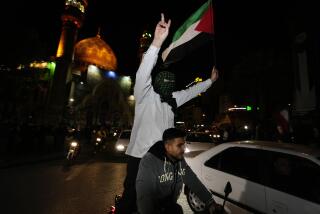Poor Suffering Most in Hospital Strike in Rio : Head of Physicians Union, State Governor Trade Charges Over 50-Day-Old Labor Action
A mother weeping over her dead baby and the body of a beggar at the door of a hospital have become daily scenes since thousands of physicians and health workers went on strike at the public hospitals of this city of 7 million people.
The crisis has deprived the poorest Brazilian patients of free medical care, except for emergency cases. With municipal and state hospitals not admitting patients, military and police hospitals have opened their doors to civilian patients.
The strike, which has lasted more than 50 days in some hospitals, is a confrontation between the state Public Health Workers Union, led by physicians, and Gov. Leonel Brizola over wage levels and funds for hospital services.
“It is a just strike because the state government has broken promises made by Gov. Brizola and simply abandoned the public hospitals,” said Dr. Crescencio Antunes Silveira Neto, president of the regional Medical Council, representing 35,000 physicians in this state.
Parallel Strikes
A parallel strike is under way in nine states, including Rio de Janeiro, of hospitals and public health clinics run by the national social security system. In this case, physicians recently received an 80% wage increase, but auxiliary personnel went on strike because they received increases of only 20%. Inflation has boosted prices 230% in the past year.
Brizola, a populist leader who plans to run for president, blames the doctors for what he calls a “radical strike” to destabilize his government. “They are a fascist group that has always tried to create problems for the government,” he said in a radio interview.
Brizola has also accused public-hospital physicians, many of whom also have private patients, of trying to “sabotage” the public health system to bolster private medical practice.
Dr. Roberto Chabo, president of the Physician’s Union, which has 20,000 members, said that the issue is pay for health workers and more money for hospital supplies. He said conditions are so bad that the public health system cannot provide an “ethically responsible level” of service to patients.
Chabo, a kidney specialist, led a strike in 1981 that lasted 57 days. That occurred under Brazil’s previous military government, and Chabo was arrested. The issues then were the same as today: pay and hospital finances.
Chabo said in an interview that the base pay of doctors who work four hours a day in the public hospitals is now equal to about $160 a month, at the official rate of exchange. Nurses earn half that, and orderlies are being paid less than the national minimum wage in some hospitals, he said. The minimum is $50 a month.
Lack of Scalpels, Sutures
In some hospitals, operating rooms are closed for lack of scalpels and sutures. There are not enough sheets in some hospital wings for the patients’ beds. Ambulances assigned to emergency duty sometimes lack gasoline.
Brizola said that he will negotiate on the strikers’ demands only after the doctors suspend their strike. The crisis has angered the public, which has seen dramatic scenes on television of a mother whose baby died of pulmonary failure after being sent from one hospital to another.
“The doctor on the strike committee at the Getulio Vargas Hospital where they refused to admit my baby is a criminal,” said Regina Celia Moreira, whose 2-month-old son died Monday.
Says Requests Ignored
The striking doctors say that they struck only after their repeated appeals, dating back to last year, for improvement in hospital conditions were ignored by Brizola and his secretary of health, Eduardo Costa.
The publicity given the hospital situation has focused attention on the allocation of funds for public health in the state budget. On paper, less than 3% is now going to the health sector, which is half the percentage assigned to that sector in Sao Paulo, Brazil’s other major urban center.
Cesar Maia, the secretary of finance in Rio de Janeiro state, said that Brizola had set aside a $400-million fund for special programs outside the regular budget. He added that only one-fifth of the money budgeted for public health had been released this year so far.
Brizola, elected in 1982, has given priority to a new school program and to small urban works, such as drainage systems, in Rio de Janeiro’s hillside shantytowns.
More to Read
Start your day right
Sign up for Essential California for news, features and recommendations from the L.A. Times and beyond in your inbox six days a week.
You may occasionally receive promotional content from the Los Angeles Times.






